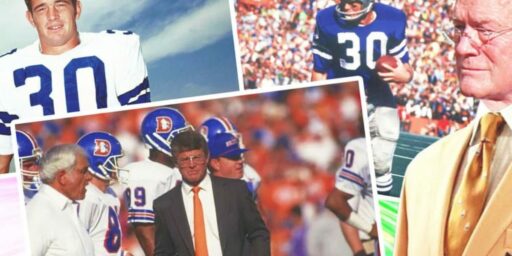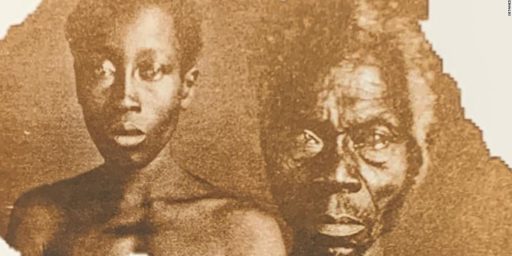Iraq War Story
One of the rewarding things about running this site is that it has put me in contact with a lot of people from around the country that I would never have encountered otherwise. This weekend, it also reacquainted me with some old comrades of mine from a time long ago and a place far, far away, 1986 and the U.S. Military Academy at West Point, respectively.
An old company-mate, Kevin Kleutz, stumbled upon the site along with about 200,000 other people doing a Google search for Nick Berg. He e-mailed and asked if I was the James Joyner he knew back then and, since I was, we spent a couple hours on the phone that evening. He put me on the company e-mail list and I have since heard from a couple others.
Interestingly, not many of those guys are still in uniform. One who is, MAJ Lanier Ward, got wounded pretty badly in Iraq a while back:
Posted on Sat, Nov. 08, 2003
Wounded soldier watches and worries about troops in Iraq
T.A. BADGER
Associated Press
SAN ANTONIO – With little left of his right elbow and the forearm below it a mesh of deep, wide scars, the war in Iraq is over for Lanier Ward.
Ward, an Army major and West Point grad with 15 years in uniform, now watches from afar. And with so many friends and comrades still in the thick of the fighting, he worries.
“I didn’t really understand until I had to come and sit in the recliner and watch on TV and see that things were occurring within my unit’s area,” he said. “I’m sitting there looking at the TV and saying, ‘Is anyone I know hurt?'”
Just a few days before Veterans Day, the number of U.S. soldiers killed in Iraq by hostile fire since President Bush declared an end to major combat May 1 is more than 140. A total of 114 U.S. soldiers were killed in action before Bush’s declaration.
Heather Ward said she knows her husband’s worries all too well – she endured them when her husband served in the Gulf War and later in the Balkans. When Lanier Ward was sent to the Middle East in March, the worries came back again, this time stronger.
“It was the worst deployment because you see it on TV and, you know, ‘In the war news, another soldier’s been killed’ and you’re wondering if it’s your soldier,” she said.
The stress was so heavy that when she got word her husband was wounded, she admits feeling relief.
“It was like a complete calmness came over me that he was alive and he was coming home, and no matter what the future holds, this part was over,” Heather Ward said. “It was like a blessing in disguise that he was hurt.”
Lanier Ward, 37, was an operations officer with the 2nd Armored Cavalry Regiment, a 5,000-troop force out of Fort Polk, La., whose job is to keep order in a large area of central Baghdad.
He was riding shotgun in one of two Humvees on a June 27 night patrol when the vehicles were shredded by shrapnel from a homemade bomb hidden amid roadside debris. One soldier was killed and Ward and three others were seriously wounded.
After the explosion, Ward sat in the street bleeding and bargaining with God for survival so he could get back to Heather and their 4-year-old daughter, Allie.
“That’s all I asked, you know, was ‘Please let me live through this,'” he said. “I want to be there for them. And everything else, you know, was icing on the cake.”
Ward had 10 surgeries in the first three weeks after the attack, and now he spends part of each day undergoing physical therapy at Brooke Army Medical Center to regain at least partial use of his injured arm.
He has more operations to come to repair severed nerves that have left much of his right hand with little or no feeling.
“I know it’ll never be 100 percent again,” Ward said, “but I’m surprised it’s still there.”
He has been assigned to Fort Sam Houston while he recuperates, and the family lives in a rented home on San Antonio’s outskirts.
Ward stays in touch with his unit by e-mail and the occasional phone call. He misses the sense of purpose he had upon arriving in Iraq and the camaraderie of warriors in the field.
When he hears from friends still deployed, “I usually walk around with a smile for the rest of the day because it re-establishes that connection, and that’s very important.”
His injuries have also re-established connections with old buddies he rarely saw anymore. Several West Point classmates and friends from growing up in Metter, Ga., have visited San Antonio to reminisce, drink a little beer and help out with chores.
Barry Depot, one of Ward’s roommates at West Point, brought some advice based on his intensive treatment for leukemia earlier this year.
“What I basically told him was that ‘You’ve got a long haul ahead of you and don’t let the downturns bum you out and really stay focused on the positive,'” said Depot, now a businessman in Utica, N.Y.
Kevin Reeves, another West Pointer, said he got the sense from late-night conversations that Ward saw enough in Iraq to be left with questions about U.S. strategy there.
“It was clear from Lanier’s standpoint and from what he was able to see that there were definitely some holes in the plan,” said Reeves, who buys and sells electricity for a power company in Columbus, Ohio.
Ward may have his concerns, but doesn’t hesitate to say that he’d go back to Iraq if physically able. His wife just shakes her head at that notion.
Lanier Ward says he’s often asked if the pain he has suffered was worth it, and his reply is that only time will tell.
“I hope that in 10 or 20 years,” he said, “we go visit my interpreter in Baghdad and walk with him down the Tigris and say, ‘It’s great what you all have been doing with your country.'”
Barry Depot was one of my roommates my last semester at the Academy and Kevin Reeves was also a fellow A-2 Spartan.
Lanier’s attitude doesn’t surprise me one bit. While few of us are the same as we were as 20-year-old kids, he was always pretty damned cheerful in a place that turned most of us into pessimists. Plus, it always strikes me when I run into guys I knew in my cadet and lieutenant days who stayed in the service how amazingly uncynical and optimistic they are.
I sure hope Lanier gets to take that trip to Baghdad in a few years.





